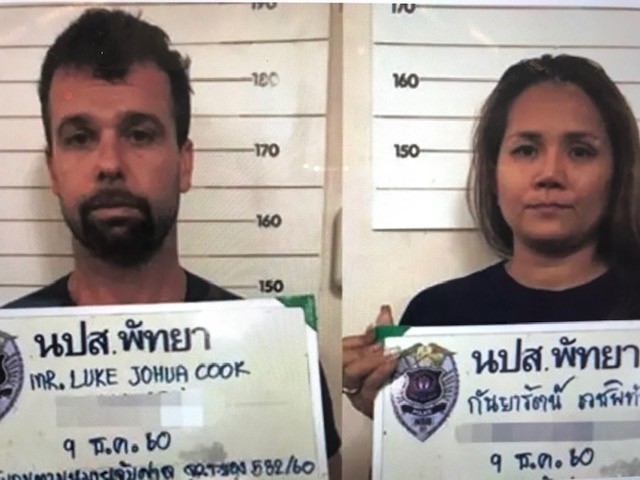Share This Article
Too often we hear reports of people unsuccessfully trying to smuggle drugs into other countries from Australia. Some may get away with it, while others are not so fortunate, resulting in severe life changing consequences.
Luke Joshua Cook and His Thai Wife
35-year-old father of two Luke Joshua Cook and his Thai wife, 40, were both arrested and charged at the Bangkok International Airport last year in December after trying to smuggle 500 kilograms of crystal methamphetamine, valued at about $300m, into Thailand.
They both received a death sentence in Thailand.
It is reported that in 2015, Cook collected the half-a-tonne of meth from a Chinese Trawler after he took a yatch into international waters off the Thai coast.
Reportedly, after being spotted by a patrol guard, Cook immediately dumped the packages overboard. The 500kg of drugs were later found washed ashore on Mae Ramphueng Beach in the Rayong Province.
Police from the Thai Narcotics Suppression Bureau reportedly believe that Cook was a Hells Angel member in Pattaya.
Reports reveal that Cook born in Perth before living in NZ as a child. He lived in WA in his teenage years before moving to Pattaya, buying a bar called ‘The Piss Stop Bar’ in beach resort when he thereafter became a member of the bikie gang.
Schapelle Corby
Schapelle Corby, 27 travelled from Australia to Indonesia where she was arrested on 8 October 2004 at the Denpasar Airport when 4.1kg of Marijuana wrapped in plastic was found in her boogie board bag.
After being charged for importing drugs she was found guilty and sentenced to 20-years imprisonment on 27 May 2005.
On 12 October 2005, the Bali High Court reduced her sentenced by 5-years.
Corby’s life thereafter attracted a large following- there was a big media crew always following every turn of the case. All Australians seemed to have had an opinion as to her guilt or innocence.
It even got to a point that the Australian Minister was being asked if the Government can advocate for her. The then Prime Minister John Howard said, “We will do everything that we are properly and reasonably asked to do to see that any relevant evidence is presented”.
Schapelle Corby’s verdict was broadcasted live for Australians to watch when she was found guilty and sentenced to twenty-years imprisonment.
This led to a campaign in Australia “Free Schappelle”.
She was eventually released on parole in February 2014. Upon her release while on parole, she was warned not to do any media interviews to avoid going back to prison. Part of her parole conditions prohibited her from providing media with any interviews.
She was finally deported back to Australia in May 2017.
Barry Wilfred Hess
50-year-old Barry Wilfred Hess, who is a former airline executive, is expected to be released from a Bali prison having served 4-months for a drug offence.
Hess, originally from Melbourne has been living in Bali for the last twelve-years. He was arrested for drug supply charges after police uncovered 14.4g of hashish and 2.7g of marijuana in his house.
He originally faced a variety of other charges, including trafficking drugs -attracting a penalty of up death by firing squad.
Lucky for him, the Denpasar District Court dismissed the more serious charges after accepting that he was someone who had failed to participate in rehabilitation notwithstanding his drug addiction.
Unlike Corby, Hess wishes to stay in Bali being a place he now calls home. His lawyer, Mohammad Hussein said, “usually, convicted criminals are deported to their own country and blacklisted from entering Indonesia again. But we are still negotiating whether he can stay here.”
The Law on Importing Drugs Charges in Australia
A person guilty of importing or exporting ‘border-controlled drugs’ into any state or Territory of Australia will face heavy penalties ranging from 10-years imprisonment to life imprisonment- depending on the type of drug and quantity/weight of the drug in question.
This is reflected in section 307.1 of the Criminal Code Act 1995 (Cth) referred to also as ‘the criminal code’.
There is a maximum penalty of up to 10-years imprisonment and/or a $420,000 fine for importing or exporting a ‘border-controlled drug’ other than a ‘marketable’ or ‘commercial quantity’.
There is a maximum penalty of up to 25-years imprisonment and/or $1,050,000 fine for importing or exporting a ‘marketable quantity’ of ‘border-controlled drugs’.
There is a maximum penalty of life imprisonment and/or $1,575,000 fine for importing or exporting at least a ‘commercial quantity’ of ‘border-controlled drugs’.
What is a ‘Border-Controlled Drug’?
A border-controlled drug includes any of the drugs listed in clause 1 of schedule 2 Criminal Code Regulations 2019 (Cth). It includes MDMA, Cannabis, Cocaine, GHB, Heroin etc.
What is the ‘Marketable Q’ and ‘Commercial Q’ of Various Border-Controlled Drugs in Australia?
For Methamphetamine, the marketable quantity is between 250g but less than 750g. The commercial quantity is at least 750g or more.
For MDMA, the marketable quantity is between 100g but less than 500g. The commercial quantity is at least 500g or more.
For Heroin, the marketable quantity is between 250g but less than 1.5kg. The commercial quantity is at least 1.5kg or more.
For Cocaine, the marketable quantity is between 250g but less than 2kg. The commercial quantity is at least 2kg or more.
For GHB, the marketable quantity is between 250g but less than 1kg. The commercial quantity is at least 1kg or more.
For Cannabis, the marketable quantity is between 25kg but less than125kg. The commercial quantity is at least 125kg or more.
What Does ‘Import’ Mean?
‘Importing’ drugs means that the drug(s) were transported and arrived into any State or Territory of Australia where it was delivered, causing it to remain here, from any other country.
Before a court can find you guilty of importing a border-controlled drug, the police have the job of proving (with enough evidence) the following elements of this charge beyond reasonable doubt:
- You had imported a border-controlled drug; and
- You had the intention of importing it at the time you were caught; and
- The drug is actually a ‘border-controlled drug’ under schedule 4 of the Criminal Code Regulation 2002 (Cth); and
- At the time you imported it, you realised that there was a significant chance (or real chance) that the packages (which contained the drugs) being imported were a prohibited drug; and
- In those circumstances, the Court forms the view that it was unjustifiable for you to have taken the risk of importing it with that knowledge where you still took the risk of importing it.
For a further detailed outline on this, see our previous blog on the defences to importing drugs into Australia.
Have any questions from this blog?
Our team are available 24/7. For questions, call our drug lawyers in Sydney on (02) 8606 2218.
Our experience criminal defence lawyers appear in all court.
Book a Lawyer Online
Make a booking to arrange a free consult today.
Call For Free Consultation
Call Now to Speak To a Criminal Defence Lawyer
Over 40 Years Combined Experience
Proven SuccessAustralia-Wide
Experienced LawyerGuarantee
 (02) 8606 2218
(02) 8606 2218
 (02) 8606 2218
(02) 8606 2218















